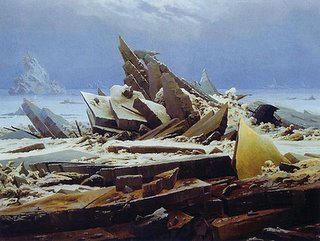 Hopkins’ great Wreck of the Deutschland unveils the reality of Christ and the human person in the tale of the wreck of a ship, the Deutschland, in a storm in the Thames—a ship coming from Bremen en route to America. Amongst the passengers were a group of Franciscan nuns, exiled from Germany on account of the anti-Catholic German laws of the time. That their exile was also the hour of their death by drowning became a symbol for Hopkins of the reality of human life in our difficult world, but also an inspiring account of the nuns’ witness to Christ by unity with His cross.
Hopkins’ great Wreck of the Deutschland unveils the reality of Christ and the human person in the tale of the wreck of a ship, the Deutschland, in a storm in the Thames—a ship coming from Bremen en route to America. Amongst the passengers were a group of Franciscan nuns, exiled from Germany on account of the anti-Catholic German laws of the time. That their exile was also the hour of their death by drowning became a symbol for Hopkins of the reality of human life in our difficult world, but also an inspiring account of the nuns’ witness to Christ by unity with His cross. As the First Part--the first ten stanzas--served as a kind of “First Principle and Foundation” or spiritual background of the encounter between God and the human person, so now the Second Part tells the story of the ship, the storm, the wreck, and the heroic witness of one of the nuns, whom we will call the Tall Nun, who calls out, “Christ, come quickly” at the climax of the poem.
Hans Urs von Balthasar pointed out in The Glory of the Lord:
“But the ultimate for Hopkins remains still his shipwreck poems, because here the foundering and shattering of all worldly images and symbols yield a final picture of the sacrament of the world: perishing and ascending to God—death as Resurrection: Resurrection not beyond death but in death. The nun on the foaming deck, who from the midst of the tumult of the elements cries ‘Christ, come quickly’—she cries to her Redeemer in and through the elements: ‘christens her wild-worst Best.’ The wreck is as a harvest (‘the goal was a shoal’); everything alive was washed away (‘lives at last were washing away’). Foundering in God—that is the high point of the poem—man finds nothing more to cling on to, not his longing nor reward nor Heaven nor any of God’s attributes, for beyond all that there is nothing but Him alone: ‘Ipse, the only one’—the self beyond any nature. Here the poet rejoices because the ‘heart right’ (cor rectum), the ‘single eye’ of the parable, is capable of the highest: to interpret the formless and unformable chaos of the night as form and in the senselessness of pure question to know the who and the why.”
So let’s explore this “Second Part” of Hopkins’ great poem as we await the coming of Christ!

No comments:
Post a Comment